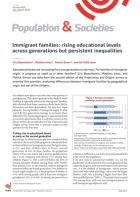
Social Statistics and Ethnic Diversity
Cross-National Perspectives in Classifications and Identity Politics
2015Epub - Editions Springer
1 The Making of Racial and Ethnic Categories: Official Statistics Reconsidered
Patrick Simon , Victor Piché , and Amélie A. Gagnon
Part I Comparative Accounts of Ethnic Statistics
2 Ethnic Classification in Global Perspective: A Cross-National Survey of the 2000 Census Round
Ann Morning
3 ‘Inside Out’: The Politics of Enumerating the Nation by Ethnicity
Tahu Kukutai and Victor Thompson
Part II Enumeration and Identity Politics
4 The Choice of Ignorance: The Debate on Ethnic and Racial Statistics in France
Patrick Simon
5 Ethnic and Linguistic Categories in Quebec: Counting to Survive
Victor Piché
6 Brazilian Ethnoracial Classification and Affirmative Action Policies: Where Are We and Where Do We Go?
José Luis Petruccelli
7 The Ethnic Question: Census Politics in Great Britain
Debra Thompson
Part III Measurement Issues and Competing Claims
8 Counting Ethnicity in Malaysia: The Complexity of Measuring Diversity
Shyamala Nagaraj, Tey Nai-Peng, Ng Chiu-Wan, Lee Kiong-Hock, Jean Pala
9 The Growth of Ethnic Minorities in Uruguay: Ethnic Renewal or Measurement Problems?
Wanda Cabella, Rafael Porzecanski
10 The Objective Approaches of Ethnic Origins in Belgium: Methodological Alternatives and Statistical Implications
Nicolas Perrin, Luc Dal, Michel Poulain
11 Social Inequalities and Indigenous Populations in Mexico: A Plural Approach
Olivier Barbary
12 Fuzzy Definitions and Demographic Explosion of Aboriginal Populations in Canada from 1986 to 2006
Éric Guimond, Norbert Robitaille, Sacha Senecal






























